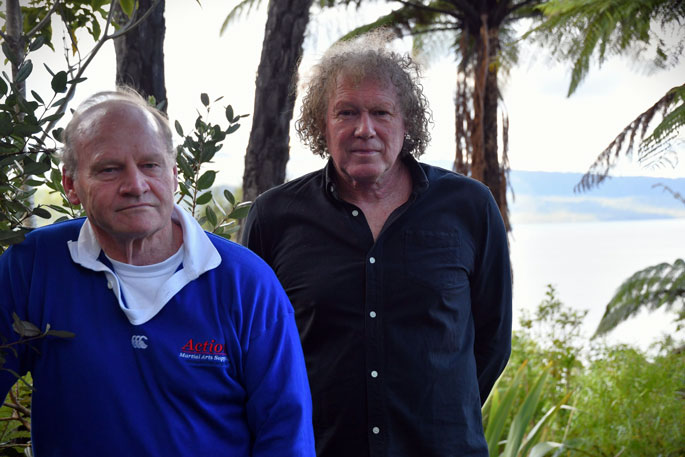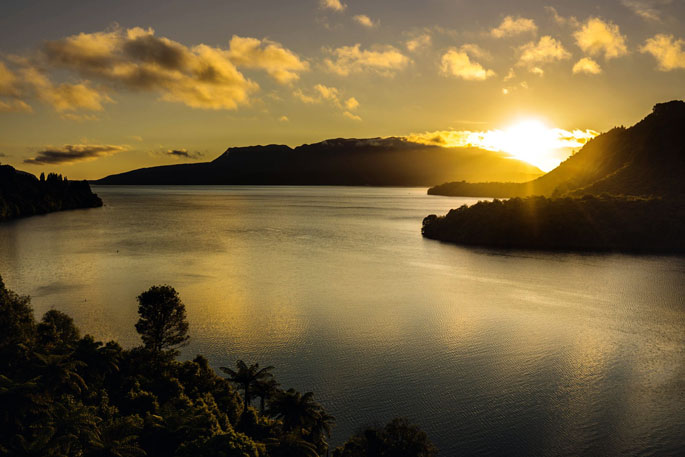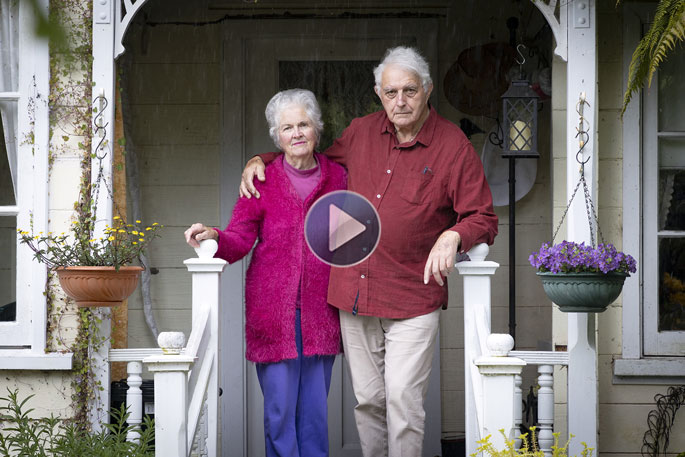Fix crumbling teeth or keep their home? A retired couple say they are weighing up their choices in the face of a potential $48,000 council bill.
Local Democracy Reporting looks into a Rotorua sewerage scheme years in the making.
Owen, 82, and Margaret Dawe, 79, have owned their Lake Tarawera cottage for 40 years and lived there permanently for the last 13.
Now they see their future threatened as they and 446 other property owners face the prospect of paying Rotorua Lakes Council $43,700 to $48,000 to be connected to a new sewerage scheme – either in a lump sum or over 10 years.
Construction of the $26.5 million to $29m scheme began in April.
It was partially subsided by the Ministry for the Environment ($6.5m), with joint funding from the Rotorua Lakes Council and Bay of Plenty Regional Council (about $1.5m). Ratepayers were set to pay the rest.
Rotorua’s council said in a statement further funding options were being explored and future operational costs would be carried by all ratepayers.
The regional council said the project aimed to minimise the risk of human waste entering the lake and protect it for future generations.
The Dawes had not worked for the past 20 years and were “horrified” by what Owen described as an impossible situation that would “ruin or change a lot of people’s lifestyles”.
Fears about lake quality declining prompted new rules around effluent treatment, which stopped new septic tanks being installed and ceased consent renewals for existing tanks in the area.
Owen said there were affluent people at Lake Tarawera but there were also retirees, young families and homeowners who have had their property handed down through generations.
While these properties may now be worth millions of dollars, that did not mean the people who owned them had much money in their pockets, he said.
He knew of one elderly woman with two properties - she would need to pay twice.
Owen understood there was a need for reticulation but he wanted the community to be able to pay for the scheme, as other communities had, over 25 years.
Tarawera residents were offered a 10-year payback period last year.
The cost for the scheme was averaged across homeowners but Owen believed their home would cost significantly less to connect than houses further away and harder to access.
He said they were “not really” able to afford the scheme without dipping into money set aside for if they got sick or needed dental work. As you get older, your teeth get “crumblier”, he said.
At the moment, he said, the couple could afford unforeseen expenses like a $500 dental bill.
“Do we let our teeth fall out then? That’s what it starts to get down to.”
The Dawes’ concern was they would need to sell their home.
The couple wanted an extended payback period or the council to cover stage one costs - about $12,500 per property excluding existing subsidies.
Lake Tarawera Community Group president Fred Stevens said the group was asking for a fair deal.
Stevens said the community group sought a repayment period of 25 years like other lakeside communities were offered.
If that was on offer initially, he believed the community would have found it reasonable.
 Lake Tarawera residents Dave Butler and Fred Stevens are part of a group that oppose the reticulation scheme costs. Photo / Laura Smith.
Lake Tarawera residents Dave Butler and Fred Stevens are part of a group that oppose the reticulation scheme costs. Photo / Laura Smith.
Rotorua Lakes Council infrastructure and environment group manager Stavros Michael said reticulation aimed to prevent about 300,000 litres of untreated sewerage from seeping into the lake each day. Nutrient reduction was a secondary objective of the reticulation.
He said the remaining uncertainty in the price depended on how much of the contingency was used in the build.
Michael said the targeted rate for future operational, maintenance and renewal costs will be carried by all ratepayers in the district connected to the council wastewater networks – an estimated extra $30 to $40 a year for most.
Properties with two or more dwellings would be assessed for extra connection costs.
Asked why the council was not paying more for the scheme, he said the targeted-rate decision would be made in 2025 or 2026 and cost information was based on the current funding plan.
Further funding options were being explored.
Reason for reticulation questioned
Tarawera resident Rohan Wells worked in the area as a scientist for more than 40 years, including researching the health of the lake for the National Institute of Water and Atmospheric Research (Niwa).
Trophic level - which indicates lake water quality - was posted as “good” at 2.7 in 2009 at Lake Tarawera.
This declined in 2014 to 3.1, rated as “average”.
Wells said the University of Waikato notified the regional council in 2019 that its water analyses had been done incorrectly for years and when corrected, the 2020 water quality matched that of 2009.
In a memorandum to the council, authors Chris McBride and Troy Baisden recommended problematic regional council data be substituted with Niwa data.
Wells said overflow from residents’ septic tanks, with soil retention, would be “well below” 1 per cent of the total nutrient sources to the lake.
Using estimates from the university and the regional council in 2012 on resident, visitor and public toilet usage, Wells calculated visitors contributed 82 per cent of the nitrogen and 64 per cent of the phosphorous to the sewage effluent.
He believed a user-pays-based system would reduce residents’ contributions to the scheme.
In his opinion: “This absurd sum is an unprecedented targeted rate. It will put a number of residents out of their homes and markedly change retirement quality for many others.”
University of Waikato land and freshwater science chairman Deniz Ozkundakci said the trophic level index was only one part of assessing overall lake health.
 Rotorua district's Tarawera is one of the last communities to be on sewerage reticulation. Photo / NZME.
Rotorua district's Tarawera is one of the last communities to be on sewerage reticulation. Photo / NZME.
The present level was indicated as 2.9.
He said the council had worked with the university to identify the source of abnormal nutrient concentrations and the council had changed its methods to mitigate interference issues.
Studies were produced in good faith and with the best information and resources available at the time, he said.
It was important to consider and evaluate confidence levels in nutrient estimates.
“Combining results from different studies can be valuable in understanding the range of plausible nutrient loads.”
Regional council‘s Rotorua catchments manager, Helen Creagh, said septic tanks were not best practice for wastewater disposal in places like lakes. The project aimed to minimise the risk of human waste entering the lake and protect it for future generations.
By the numbers: Tarawera sewerage scheme
- Stage one, $13.4m, began in April and involved laying pipes and installing pump stations. It included provision for 100 undeveloped properties that would only pay for this stage when applying for building consent.
- Stage two, $11.1m, would install pumps on existing properties and connect them to the mains network.
- Residents are required by law to connect to a reticulated wastewater system if one is provided.
- The latest complete cost of the project was projected to be from $26.5m to $29m. The council will pay $750,000.
- Projected scheme costs fluctuated over the years. In the council’s 2018-2028 Long-term Plan, it was $21,850 including GST. In 2021, the estimate was about $33,000 per household based on the total of $22.5m. Last year the total was estimated at $34m.
Public Interest Journalism funded through NZ On Air.




1 comment
Cost of living on a lake...
Posted on 04-12-2023 13:30 | By fair game
Most people would love to have lake or sea views. Unfortunately they do come at a premium for all different reasons, and this is one of them. House prices in town and in the country are dropping though, so there are good options to move somewhere cheaper. They will still get a good price for a likeside property. No sympathy for people complaining when they own 2 homes. Think we would all like to own 2 properties!
Leave a Comment
You must be logged in to make a comment.